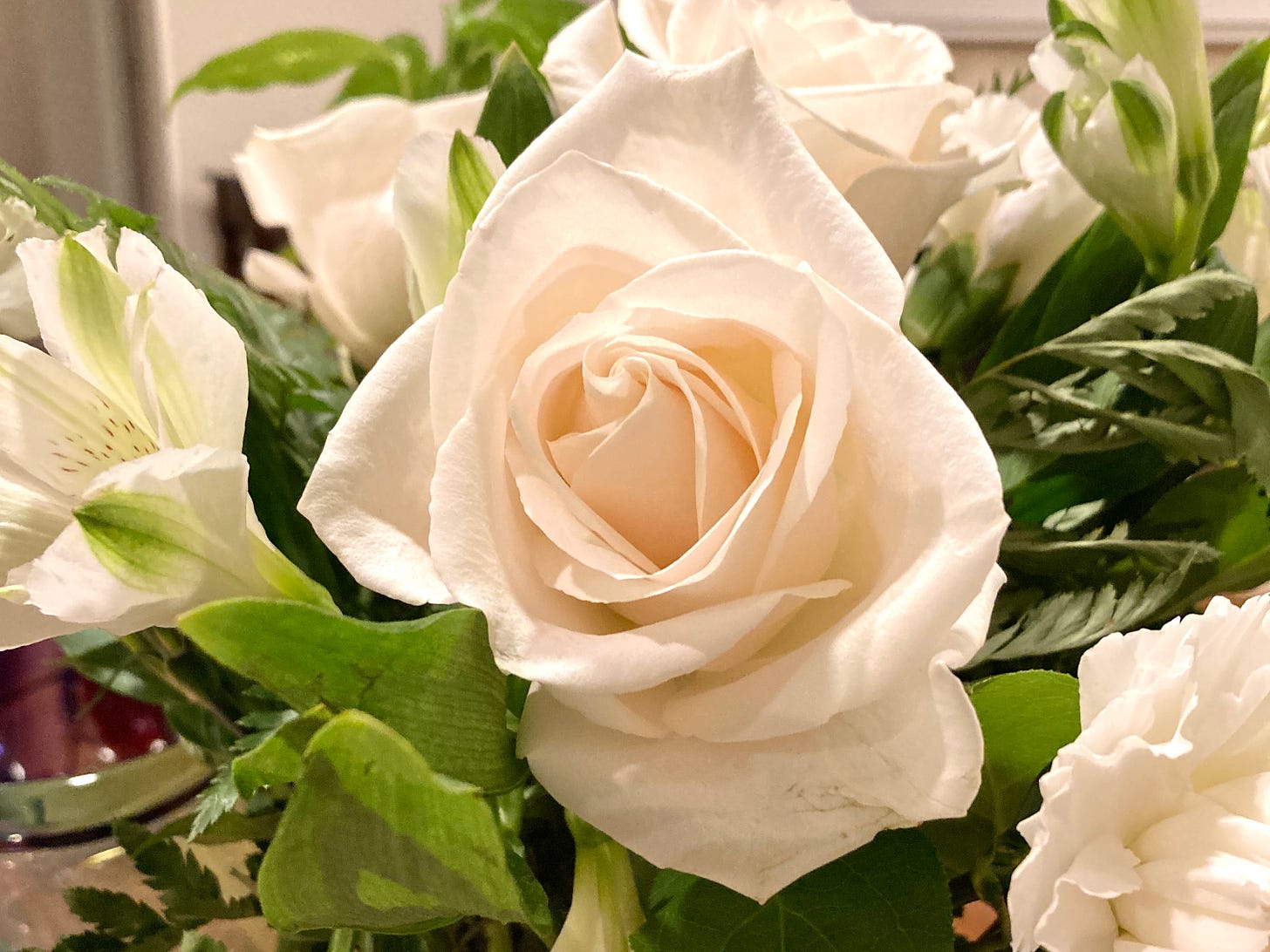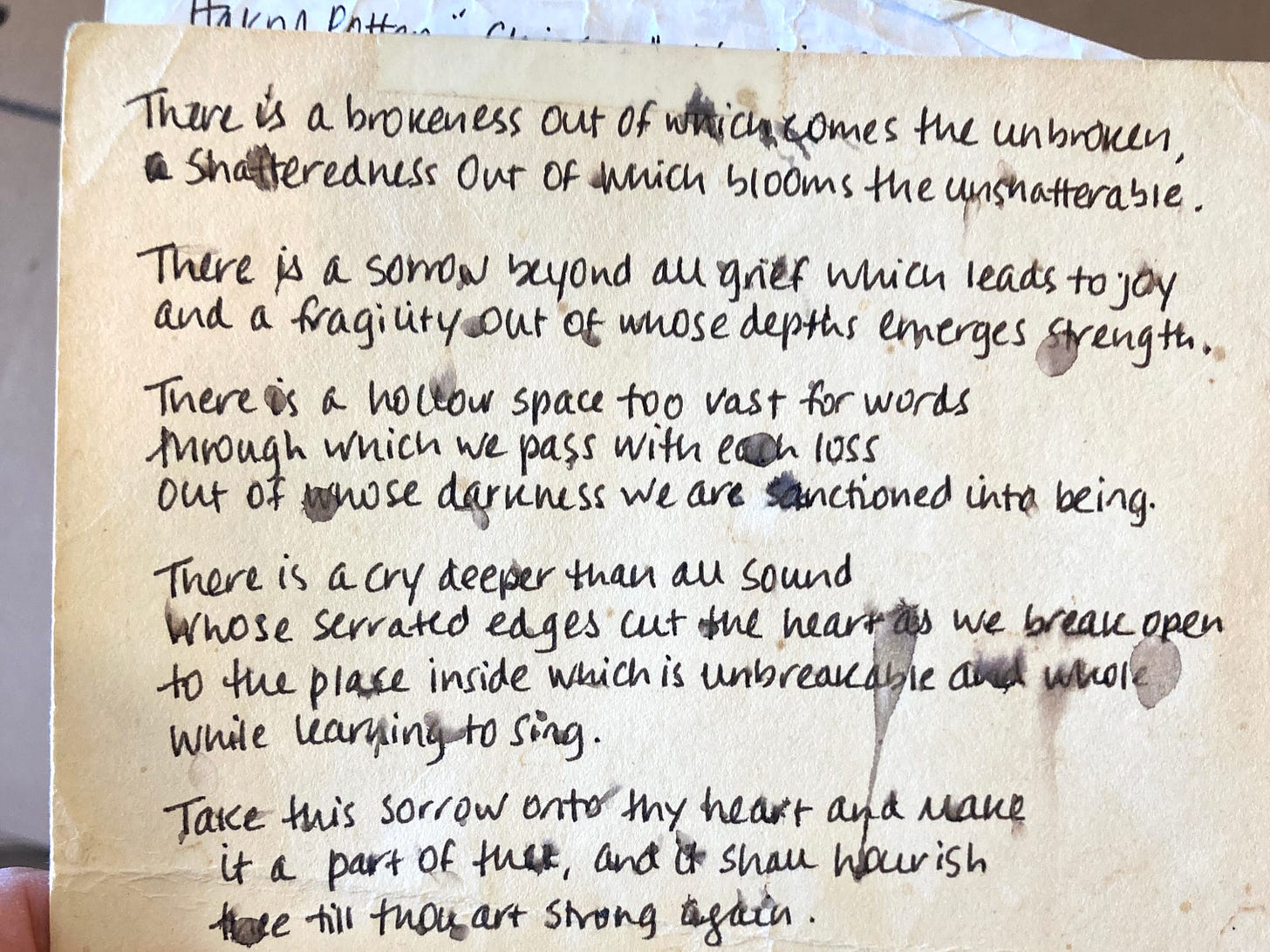The price tag of loss
When things fall apart, how do we evaluate what’s gone and what remains?
Your Five-Year Plan is a newsletter about embracing life’s profound uncertainty.
Maybe your own plans went up in flames; maybe you’re considering a big, scary leap. This is your trusty companion while you’re writing the next life chapter.
Welcome to the conversation—and to the adventure that unfolds when your plans go sideways. This is letter #1. ✨
It’s June 2018. I’m sitting cross-legged on the floor of a Ritz Carlton suite booked with credit card points. My mom sits to my left, my fiancé to my right.
We’re surrounded by thirty-six bud vases, floral scissors, and a mountain of burgundy and white blooms destined for our wedding reception: calla lilies, snapdragons, freesia, spray roses, hypericum, veronica. I’ve taken a few days away from my first financial planning job for the occasion.
We’re stripping leaves off stems, trimming each to the appropriate height, and concocting different arrangements—basically, trying to make it look like we know what we’re doing. We’re doubled over laughing about the eucalyptus detritus that’s glued itself under our fingernails, impervious to all removal efforts.
Within five years, I’ll be divorced, my mom will be dead, and I’ll be newly laid off. The path ahead looked straightforward from where I was sitting, but eventually it would bank left into a patch of fog.
What is loss? Is it a cost—a price we pay? Something that’s taken from us? A withdrawal from an account that, fingers crossed, is large enough to withstand the debit?
It wouldn’t take much to convince someone that divorce has an emotional cost—I mean, just ask my therapist.
And it could be neatly expressed as a financial cost—down to the penny, in fact. It would take just a few clicks for me to pull up the spreadsheet my ex and I drafted to divide our shared assets. We confirmed the figures amicably over mugs of coffee, each of us good-naturedly suggesting that the other should be asking for more, always looking out for each other’s best interest.
When my mom died, I lost my biggest fan—is there a price tag big enough to express that cost? As my brother and I cleared out her townhouse in suburban Chicago, we found box after box stuffed full of our childhood artwork. She’d treasured every egg-carton-and-feather creation, every lump of clay our chubby little hands had shaped.
In one drawer, I found her complete printout of the blog I’d written for almost a decade; the date stamps hadn’t printed automatically, so she’d flipped through each page and added the publication dates by hand in felt-tip pen.
I’m not sure how you value that kind of devotion. Or the retirement she never got to enjoy, or the trips we’d started planning before her cancer came back.
And how do you measure the cost of the job you lost less than a month after your mother’s passing? As some multiple of your monthly salary? Or is a pulled anchor too ineffable to value—a stolen sense of normalcy in the aftermath of a personal crisis?
If loss is a cost, I’m left with a few questions: how do I explain everything these experiences didn’t cost me? Everything that they gave me?
As Rabbi Steve Leder might ask: how do we reckon with the beauty of what remains?
The end of my marriage wasn’t the end of an enduring friendship. My ex and I share cat custody and a daily stream of adorable pet photos. We remain cheerleaders for each other’s creative projects.
Last week, we ate pizza at the dining table whose pros and cons we’d once debated at West Elm. He recounted stories from a trip to his girlfriend’s hometown as my boyfriend and I listened, beers in hand.
Our marriage may have reached its conclusion, but our bond as extended family didn’t. When my mom got sick, he booked a plane ticket to see her just as quickly as I did.
I learned that relationships can evolve. That letting go of what isn’t working creates space, and that space invites possibility.
My boss eliminated my job, but there are things she never had the power to take away. My identity and sense of purpose. Conviction in my own abilities.
When my mom’s cancer returned, her anxiety spiked as she struggled to decide on a treatment plan. I flew to Chicago from my home in Washington; my brother and I would stagger our visits so she wouldn’t be alone.
After my first trip, she wrote me a note whose last line read: “I have a deeper understanding of what love is about after this time with you.” In one brief sentence, she captured everything that would grow out of this shared experience.
So loss exacts terrible costs, and it can offer unexpected glimmers of beauty and hope. Maybe it’s more like a balance sheet, then: we tally the negatives in one column and the positives in another, weighing them against each other to express a tidy bottom line—our Takeaway From The Experience™️.
Who wouldn’t want a black-and-white way to make sense of life’s trials, to net out what we’ve lost and gained? I certainly would.
But sitting down to create a profit and loss statement from the ashes of my five-year plan, I stumble across a roadblock. If the details of a loss can be tagged as “negative” or “positive,” what do I do with the bittersweet moments? Like the loneliness and freedom that accompanied the end of my marriage?
My mom’s medical needs become all-consuming. She returns from an extended hospital stay, her debilitating pain and panic attacks tenuously under control. She’s elected to stop her immunotherapy treatments, which haven’t been working. She gets hooked up to portable IV bags filled with ketamine and hydromorphone, and comes home as a hospice patient.
I rush back to Chicago, this time on a one-way ticket.
I help her call forth a steady stream of online orders to make her bedroom extra-cheerful: piles of faux-fur blankets, pillows adorned with prints of Klimt paintings, twinkling tree LED lamps (these take forever to clear customs), giraffe earrings from Etsy for a “virtual safari,” bottomless bowls of sea salt caramels and Bazooka bubblegum. She buys ten composition notebooks for writing her autobiography. She’s delighted every time UPS rings the doorbell.
When she dies, the pain of sifting through these items—one pile to keep, one to donate, one to throw away—is excruciating.
I walk into my home office in Washington for the first time post-layoff. I’d been performing an impossible juggling act for months in Chicago: full-time work plus caregiving. Now, suddenly, there’s nothing to juggle.
A stack of business cards sits proudly on my desk. It represents two years of night-and-weekend studying for this big career change, plus six years spent transforming book learning into wisdom. What do those years of dogged effort mean now?
At every turn, moments that defy neat categorization.
Loss is an impressionist painting that blurs or comes into sharp relief based on where you’re standing.
It’s the inkblot of a Rorschach test whose interpretation depends on how your eyes skim over it.
It’s the novel you dissect during book club, posing complex and unanswerable questions that—two glasses of Chardonnay in—nobody can quite agree on.
It’s the piece of sea glass you turn over in your hand, once a sharp piece of refuse, now made smooth and beautiful by time and tides that rise and fall in perpetuity.
Loss isn’t quantifiable, and its lessons aren’t tidy or pat. I will never be able to define the boundaries of my own losses with precision, or characterize them with any sense of finality. I’ll just keep moving intentionally through the aftermath, exploring each new insight on this page.
💬 What do you think?
I’m curious to hear from you. The last time you dealt with a crisis, disappointment, or setback—whether personal or professional—what was the most unexpected thing you lost or gained as a result?
Had your own plan-in-flames experience? Taking a leap into the unknown? I’d love to hear more. Just hit “reply” to get in touch, or introduce yourself here.
Warmly,
Maddie







Ohhhhhh! You speak to my core Maddie. “But sitting down to create a profit and loss statement from the ashes of my five-year plan, I stumble across a roadblock. If the details of a loss can be tagged as “negative” or “positive,” what do I do with the bittersweet moments?” Those bittersweet moments intrigue me most - how can pain and beauty, grief and joy coexist? I wonder if it is in the intersection of these opposites that unconditional love is born.
so beautifully written, I can feel you working your way through all of these emotions in a way that feels pretty familiar to me. Lately I've appreciated being able to look back at past traumas with more objectivity. Though I haven't quite been able to suss out if it's a matter of age or time/distance way. maybe both? It's pretty interesting!